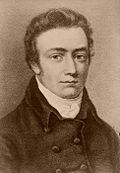Portal:Poetry
Welcome to the Poetry Portal
Poetry (derived from the Greek poiesis, "making"), also called verse, is a form of literature that uses aesthetic and often rhythmic qualities of language − such as phonaesthetics, sound symbolism, and metre − to evoke meanings in addition to, or in place of, a prosaic ostensible meaning. A poem is a literary composition, written by a poet, using this principle.
Poetry has a long and varied history, evolving differentially across the globe. It dates back at least to prehistoric times with hunting poetry in Africa and to panegyric and elegiac court poetry of the empires of the Nile, Niger, and Volta River valleys. Some of the earliest written poetry in Africa occurs among the Pyramid Texts written during the 25th century BCE. The earliest surviving Western Asian epic poetry, the Epic of Gilgamesh, was written in Sumerian.
Early poems in the Eurasian continent evolved from folk songs such as the Chinese Shijing, as well as religious hymns (the Sanskrit Rigveda, the Zoroastrian Gathas, the Hurrian songs, and the Hebrew Psalms); or from a need to retell oral epics, as with the Egyptian Story of Sinuhe, the Indian epic poetry, and the Homeric epics, the Iliad and the Odyssey. Ancient Greek attempts to define poetry, such as Aristotle's Poetics, focused on the uses of speech in rhetoric, drama, song, and comedy. Later attempts concentrated on features such as repetition, verse form, and rhyme, and emphasized the aesthetics which distinguish poetry from more objectively-informative prosaic writing. (Full article...)
Selected article
The conversation poems are a group of eight poems composed by Samuel Taylor Coleridge (1772–1834) between 1795 and 1807. Each details a particular life experience which lead to the poet's examination of nature and the role of poetry. They describe virtuous conduct and man's obligation to God, nature and society, and ask as if there is a place for simple appreciation of nature without having to actively dedicate one's life to altruism.
The Conversation poems were grouped in the 20th-century by literary critics who found similarity in focus, style and content. The series title was devised to describe verse where Coleridge incorporates conversational language while examining higher ideas of nature and morality. The works are held together by common themes, in particular they share meditations on nature and man's place in the universe. In each, Coleridge explores his idea of "One Life", a belief that people are spiritually connected through a universal relationship with God that joins all natural beings.
Critics have disagreed on which poem in the group is strongest. Frost at Midnight is usually held in high esteem, while Fears in Solitude is generally less well regarded.. (Full article...)
Selected image
Poetry WikiProject
Selected biography
Mário Raul de Morais Andrade (October 9, 1893 – February 25, 1945) was a Brazilian poet, novelist, musicologist, art historian and critic, and photographer. One of the founders of Brazilian modernism, he virtually created modern Brazilian poetry with the publication of his Paulicéia Desvairada (Hallucinated City) in 1922. He has had an enormous influence on modern Brazilian literature, and as a scholar and essayist—he was a pioneer of the field of ethnomusicology—his influence has reached far beyond Brazil.
Andrade was the central figure in the avant-garde movement of São Paulo for twenty years. Trained as a musician and best known as a poet and novelist, Andrade was personally involved in virtually every discipline that was connected with São Paulo modernism, and became Brazil's national polymath. His photography and essays on a wide variety of subjects, from history to literature and music, were widely published. He was the driving force behind the Week of Modern Art, the 1922 event that reshaped both literature and the visual arts in Brazil, and a member of the avant-garde "Group of Five." The ideas behind the Week were further explored in the preface to his poetry collection Pauliceia Desvairada, and in the poems themselves.
After working as a music professor and newspaper columnist he published his great novel, Macunaíma, in 1928. Work on Brazilian folk music, poetry, and other concerns followed unevenly, often interrupted by Andrade's shifting relationship with the Brazilian government. At the end of his life, he became the founding director of São Paulo's Department of Culture, formalizing a role he had long held as the catalyst of the city's—and the nation's—entry into artistic modernity. (Full article...)
Did you know (auto-generated) -
- ... that when Cordula Wöhler was expelled from a Lutheran pastor's household for converting to Catholicism, she wrote a poem that became one of the most popular hymns to Mary in German?
- ... that Laura Ashe believes the Gawain Poet used the beheading game to criticize the emptiness of chivalry?
- ... that Felix Mendelssohn subtitled Sechs Lieder, Op. 59, six songs for four voices setting poems by Eichendorff and others, "Im Freien zu singen" ("To be sung outdoors")?
- ... that Dolores Cabrera y Heredia, a Spanish Romantic poet and novelist, was a prominent member of Hermandad Lírica (Lyrical Sisterhood)?
- ... that Saudi Arabian poet Hamad al-Hajji lost three members of his family during his childhood and later suffered from schizophrenia until he died at the age of 49 after a lung disease?
- ... that Blanche Zacharie de Baralt was the University of Havana's first woman philosophy graduate and the first person to translate Tagore's poems into Spanish?
Selected poem
| Eight Sonnets: Sonnet 1 by Edna St. Vincent Millay |
|---|
|
When you, that at this moment are to me |
Related portals
Topics
Recognized content
Categories
Associated Wikimedia
The following Wikimedia Foundation sister projects provide more on this subject:
-
Commons
Free media repository -
Wikibooks
Free textbooks and manuals -
Wikidata
Free knowledge base -
Wikinews
Free-content news -
Wikiquote
Collection of quotations -
Wikisource
Free-content library -
Wikiversity
Free learning tools -
Wiktionary
Dictionary and thesaurus






